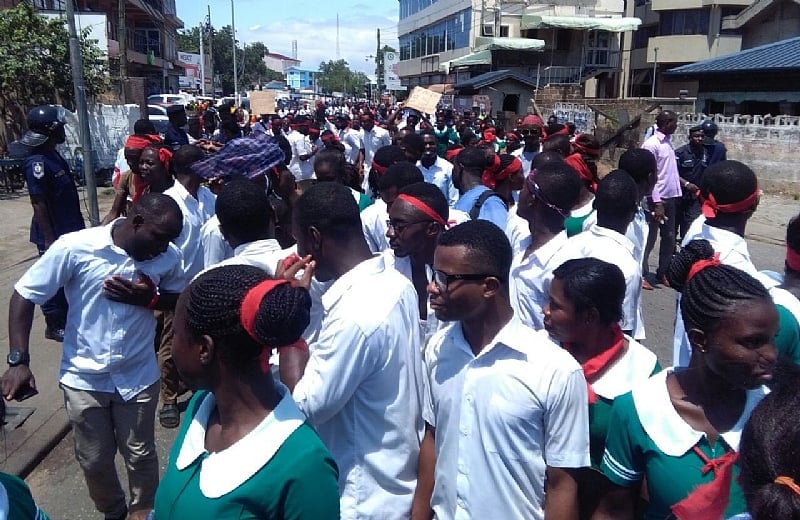The ongoing labor dispute between the Ghana Registered Nurses and Midwives Association (GRNMA) and the Ghanaian government has taken a significant legal turn, further complicating the already strained relationship between the two parties. The core issue revolves around unresolved negotiations concerning the nurses and midwives’ conditions of service, a point of contention that has led to a nationwide strike, disrupting healthcare services and impacting patients across the country. In an attempt to quell the strike action, the National Labour Commission (NLC) secured an interlocutory injunction against the GRNMA on June 5th, prohibiting the association from continuing its industrial action. However, the NLC’s initial attempts to directly serve the GRNMA with the injunction proved unsuccessful, prompting the commission to seek alternative methods of service.
This led to the NLC’s application to the Accra High Court’s Industrial and Labour Division for permission to serve the injunction through substituted means. Justice Priscilla Dikro Ofori, presiding over the case, granted the NLC’s request on Tuesday, June 10th, paving the way for the injunction to be served indirectly. The court authorized a multi-pronged approach to ensure the GRNMA receives formal notification of the injunction. This includes physically posting the court order on the court’s notice board and at the main entrance of the GRNMA’s head office, ensuring visibility and accessibility of the document. Furthermore, recognizing the prevalence of digital communication, the court also directed the NLC to send digital copies of the injunction via WhatsApp to key figures within the GRNMA: President Perpetual Ofori Ampofo and General Secretary David Tenkorang-Twum.
The court’s decision to allow substituted service is a crucial development in the ongoing legal battle. It acknowledges the difficulties encountered by the NLC in directly serving the GRNMA and provides a legally sound mechanism for ensuring the association is formally notified of the injunction. This ruling effectively circumvents any potential claims by the GRNMA that they were unaware of the court order, thereby strengthening the legal standing of the NLC’s actions. The court established a 14-day period following the postings and digital delivery for the substituted service to be deemed officially completed. This timeframe provides the GRNMA with ample opportunity to acknowledge receipt and respond accordingly to the court order. This procedural step is critical in ensuring the legal process is fair and transparent, providing all parties involved with adequate time to react and prepare their legal strategies.
The underlying tension fueling this confrontation stems from the GRNMA’s persistent assertion that the government has failed to address their longstanding grievances concerning their conditions of service. These concerns likely encompass issues such as salaries, working hours, benefits, and the overall working environment within the healthcare sector. The GRNMA’s decision to embark on a nationwide strike underscores the depth of their dissatisfaction and their resolve to pressure the government into addressing their demands. The NLC’s move to secure and serve an injunction against the strike, however, signals the government’s determination to maintain essential healthcare services and prevent further disruption to the healthcare system. This clash of interests sets the stage for a protracted legal and labor dispute with potential ramifications for both the healthcare sector and the wider Ghanaian public.
The granting of the injunction and its subsequent service via substituted means marks a significant escalation in the ongoing standoff between the GRNMA and the government. The NLC, acting on behalf of the government, aims to legally compel the association to cease its strike action and return to the negotiating table. The GRNMA, however, maintains its position that their concerns remain unaddressed, suggesting a potential defiance of the court order and a continuation of the industrial action. This potential defiance could lead to further legal action against the GRNMA, including contempt of court proceedings, potentially exacerbating the already tense situation. The government’s response to the GRNMA’s potential defiance will be crucial in determining the trajectory of this dispute. A heavy-handed approach could further alienate the nurses and midwives, while a conciliatory approach might open avenues for meaningful dialogue and a resolution to the impasse.
The unfolding legal and labor dispute between the GRNMA and the Ghanaian government represents a complex and multifaceted challenge. It highlights the critical role of nurses and midwives in the healthcare system, their concerns about their working conditions, and the government’s responsibility to ensure the smooth operation of essential services. The court’s decision to allow substituted service of the injunction is a pivotal moment in this ongoing saga. It remains to be seen how the GRNMA will respond to the officially served injunction and whether this legal maneuver will pave the way for a return to negotiations or further escalate the conflict. The resolution of this dispute will have significant implications for the future of labor relations in Ghana’s healthcare sector and the overall well-being of its citizens.


